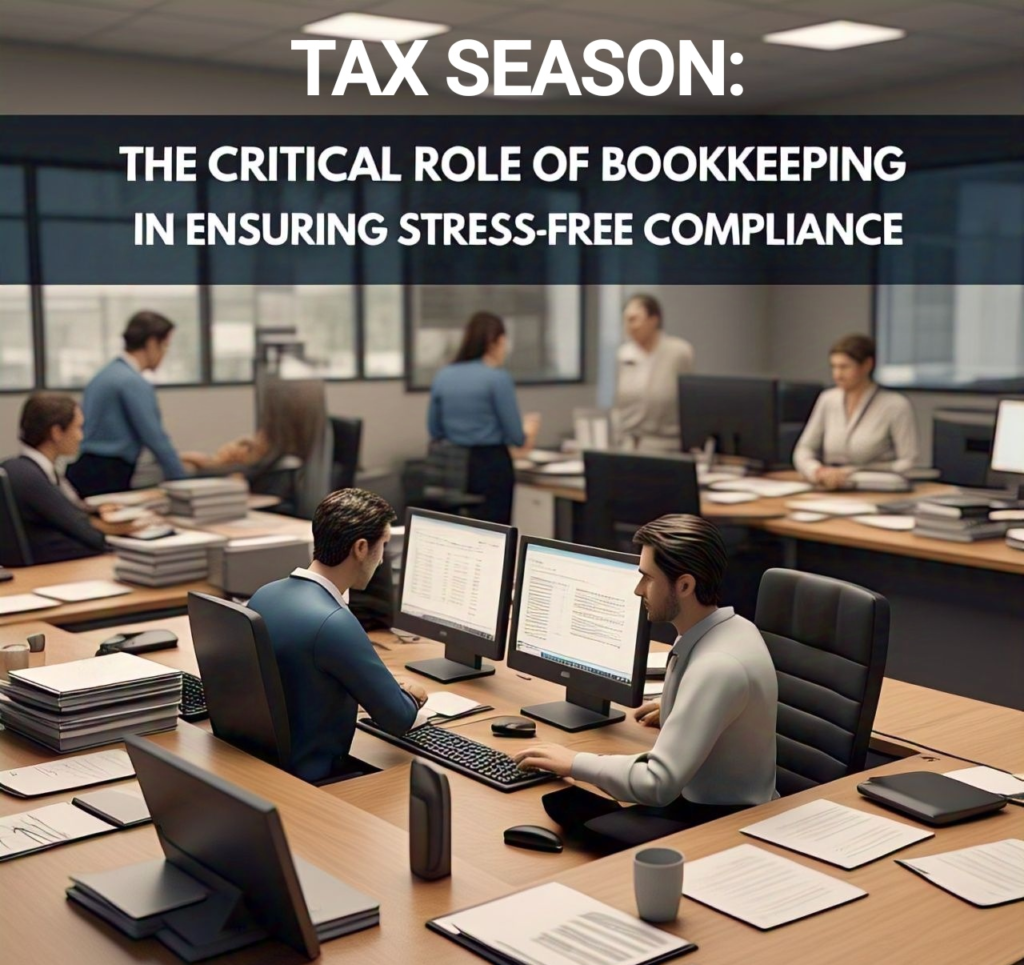POSITIVE AND NEGATIVE TAX SEASON: 4 CRITICAL ROLES OF BOOKKEEPING IN ENSURING STRESS-FREE COMPLIANCE
As a business owner in Canada, tax season can be a daunting and stressful time. Ensuring compliance with tax regulations and meeting deadlines can be overwhelming, especially if you’re not well-prepared. However, with the right bookkeeping practices in place, you can navigate tax season with ease and confidence. In this article, we’ll explore the critical role of bookkeeping in ensuring stress-free compliance during tax season.
THE IMPORTANCE OF BOOKKEEPING IN TAX COMPLIANCE
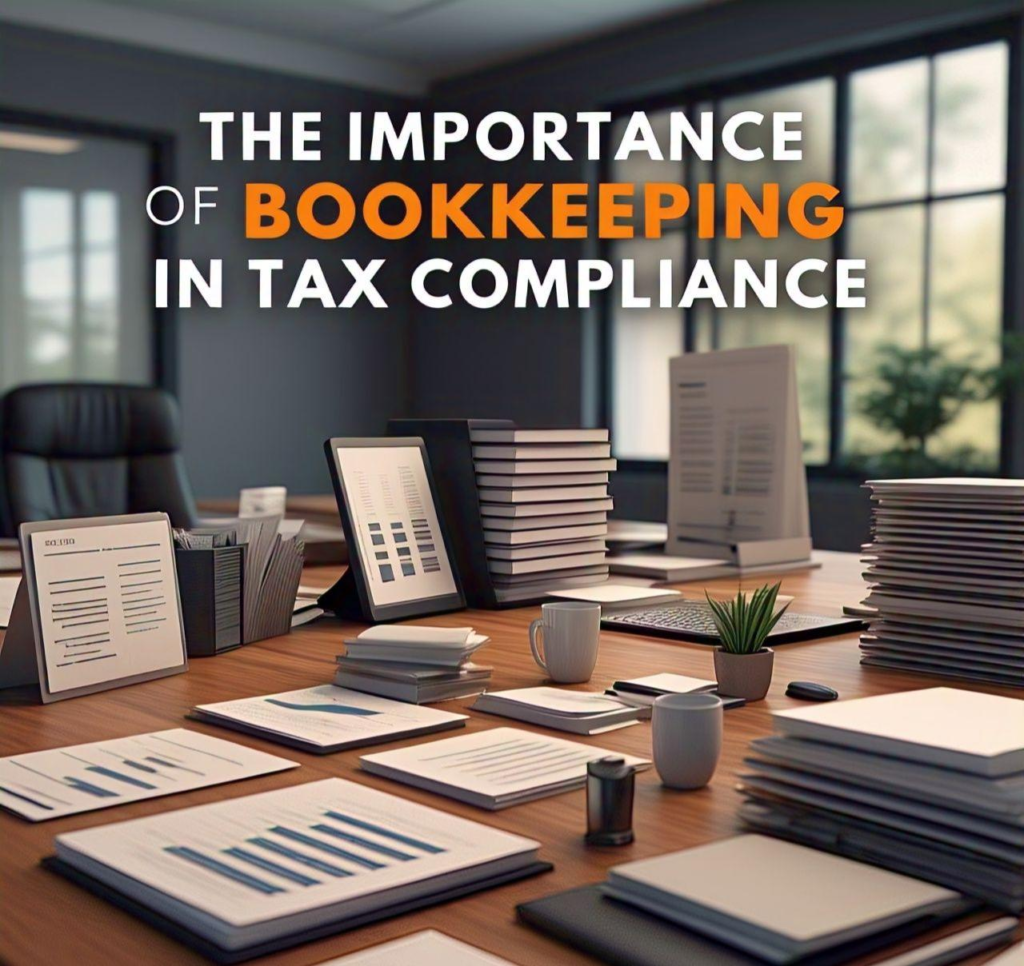
Bookkeeping is the foundation of tax compliance. It involves the accurate and timely recording of financial transactions, including income, expenses, assets, liabilities, and equity. By maintaining accurate and up-to-date financial records, you can ensure that your business is in compliance with tax regulations and avoid costly penalties and fines.
Bookkeeping is also a crucial aspect of tax compliance, and its importance cannot be overstated. In this section, we will explore the definition of bookkeeping, its role in tax compliance, and the benefits of accurate and up-to-date financial records.
WHAT IS BOOKKEEPING?
Bookkeeping is the process of recording, classifying, and reporting financial transactions of a business. It involves the accurate and timely recording of financial data, including income, expenses, assets, liabilities, and equity. Bookkeeping provides a clear picture of a business’s financial health and is essential for making informed business decisions.
THE ROLE OF BOOKKEEPING IN TAX COMPLIANCE
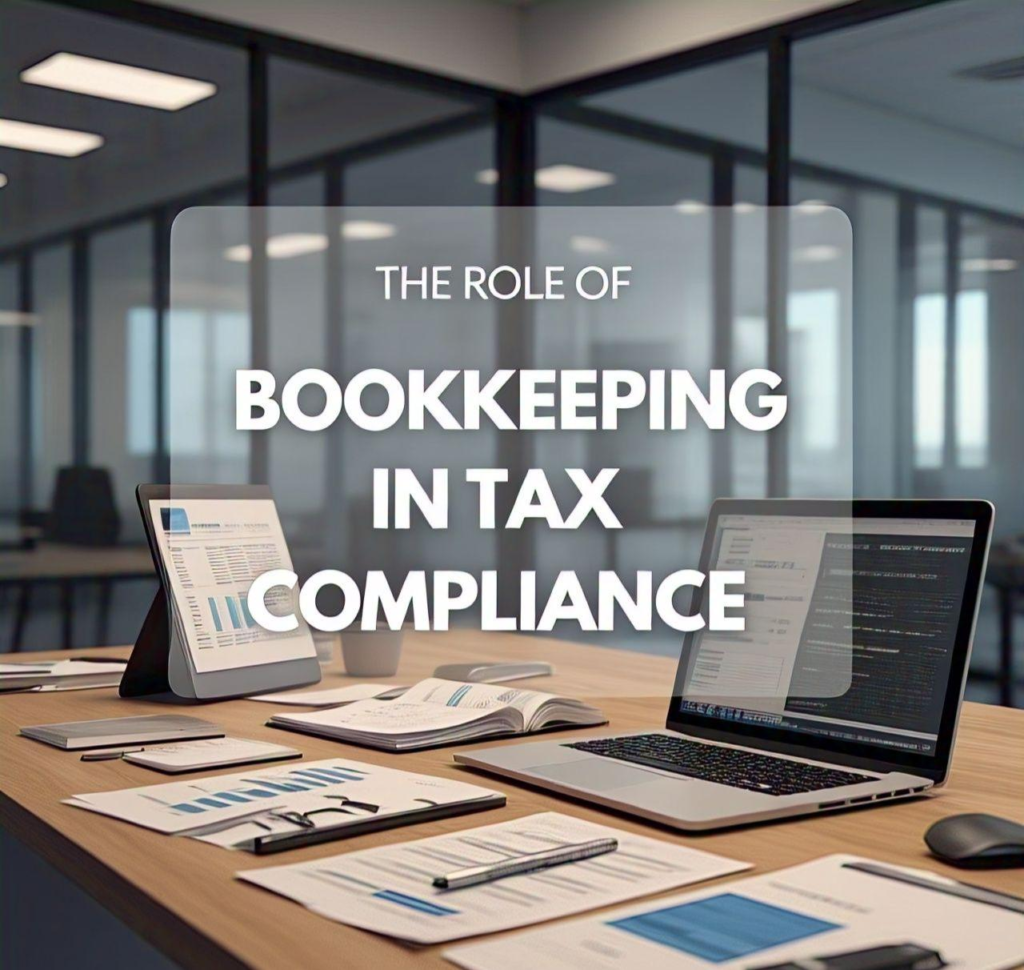
Bookkeeping plays a critical role in tax compliance by providing the necessary financial data to prepare accurate tax returns. Accurate and up-to-date financial records enable businesses to:
1. Track Income And Expenses: Bookkeeping helps businesses track their income and expenses, which is essential for calculating taxable income.
2. Identify Tax Deductions And Credits: Accurate financial records help businesses identify tax deductions and credits that they are eligible for.
3. Prepare Accurate Tax Returns: Bookkeeping provides the necessary financial data to prepare accurate tax returns, reducing the risk of errors and penalties.
4. Comply With Tax Regulations: Bookkeeping helps businesses comply with tax regulations, such as filing deadlines and payment requirements.
POSITIVE AND NEGATIVE TAX SEASON: NAVIGATING THE UPS AND DOWNS OF TAX TIME
Tax season is a time of the year that evokes a variety of emotions for individuals and businesses alike. While it offers certain advantages, it also brings its own set of challenges. Understanding both the positive and negative aspects of tax season can help taxpayers approach it with more confidence and preparedness. This article explores the key positives and negatives of tax season and provides guidance on how to make the most of both.
Positive Aspects of Tax Season
- Tax Refunds One of the most anticipated outcomes of tax season is the potential for a tax refund. Many taxpayers overpay throughout the year through payroll deductions or estimated payments. When they file their taxes, they may receive a refund, which can serve as a financial windfall. This refund provides an opportunity to save, invest, or pay off debt. For many, a tax refund feels like a bonus, making tax season a time of relief.
- Financial Organization Tax season serves as a natural prompt to organize your financial records. Whether you’re filing personal taxes or business taxes, you’ll need to gather receipts, statements, and other documentation. This can be a valuable exercise in getting your finances in order. By preparing your financial documents for tax season, you also improve your overall financial organization, which can benefit you throughout the year.
- Opportunity for Tax Planning Tax season offers the chance to review your financial situation and consider ways to optimize your tax obligations. This may include contributing to tax-advantaged retirement accounts, exploring tax deductions and credits, or adjusting your withholdings for the coming year. By planning ahead, taxpayers can minimize their tax liabilities and take advantage of various strategies to reduce the amount they owe or increase their refunds.
- Access to Professional Tax Advice Many individuals and businesses seek professional help during tax season. Whether it’s hiring a tax preparer or working with a certified public accountant (CPA), this professional guidance can ensure that your taxes are filed correctly and efficiently. Experienced tax professionals can also advise you on ways to reduce your tax burden through deductions, credits, or other legal strategies, helping you to maximize your refund or minimize any liabilities.
- Clearer Financial Picture Filing taxes provides a comprehensive snapshot of your financial situation. You get to review your income, expenses, investments, and savings, helping you assess your financial health. Understanding where your money is going can lead to better budgeting, saving, and spending decisions. For businesses, filing taxes offers an opportunity to gauge profitability and make strategic adjustments for future growth.
- Potential Tax Deductions and Credits Tax season presents an opportunity to claim various deductions and credits that reduce your taxable income or directly reduce your tax bill. These may include deductions for student loan interest, mortgage interest, and charitable contributions. Tax credits, such as the Child Tax Credit or Earned Income Tax Credit, can provide a significant financial benefit, especially for low- to moderate-income individuals.
- Streamlined Business Operations For businesses, tax season offers an opportunity to review financial statements, reconcile accounts, and ensure that all deductions and expenses are properly accounted for. With careful planning and organization, tax season can become a routine part of business operations, helping companies maintain compliance and improve their overall financial efficiency.
- Opportunity to Pay Off Debt For individuals and businesses facing debt, a tax refund or savings from tax deductions can be used to pay off outstanding liabilities. Reducing debt can improve cash flow, reduce financial stress, and contribute to a healthier financial outlook in the long run.
- Improved Cash Flow Proper tax planning can contribute to improved cash flow. For businesses, timely filing of taxes and maximizing deductions can lead to lower taxable income, which means less money paid in taxes and more retained for operational needs. For individuals, managing tax payments can prevent financial strain during the year and allow for more predictable cash flow.
Negative Aspects of Tax Season
- Tax Filing Stress For many, tax season brings stress and anxiety. The pressure to file on time, the fear of making mistakes, and the complexity of the tax code can be overwhelming. This stress is particularly heightened for those who struggle with tax paperwork, unfamiliarity with the process, or the fear of owing money.
- Risk of Errors or Omissions Tax filing requires attention to detail, and small errors or omissions can lead to delays in processing or even penalties. Common mistakes include forgetting to report income, failing to claim deductions, or incorrectly filling out forms. These errors can result in audit risks, delayed refunds, or extra work to fix issues after filing.
- Potential for Tax Audits The possibility of a tax audit looms over many during tax season. While the IRS audits a relatively small percentage of returns, the fear of an audit can cause significant stress. Those who do not file their taxes accurately or who engage in questionable tax practices may face scrutiny. However, staying organized, keeping proper records, and working with a professional can minimize the risk of an audit.
- Complex Paperwork Filing taxes can be a complicated and time-consuming process, especially for those with multiple income sources, investments, or deductions. Taxpayers often need to gather various forms, such as W-2s, 1099s, and receipts, and make sense of complex tax laws. This paperwork can be especially burdensome for small business owners who must keep track of their finances meticulously.
- Last-Minute Scramble The tendency to procrastinate means that many individuals and businesses rush to file their taxes in the final days before the deadline. This last-minute scramble increases the chances of mistakes, missing deductions, or failing to file on time. It can also lead to unnecessary stress and the need to pay for expedited services.
- Additional Costs for Professional Services While professional tax preparers can help ensure accurate filings, their services come at a cost. Many individuals and businesses must pay for tax preparation assistance, which can add up, especially if the taxes are complex. These fees can be a burden, particularly for those who may not receive a significant refund or who have limited financial resources.
- Time-Consuming Process Tax season can be a time-consuming process, particularly for those who have not maintained organized records throughout the year. Gathering documents, completing forms, and reviewing information takes time, which can interfere with other personal or business responsibilities. This added burden can detract from other priorities, leading to frustration.
- Delays in Receiving Refunds Although many taxpayers look forward to their refunds, delays in processing can cause financial strain. Some refunds may be delayed due to errors on the return, high volumes of filings, or fraud prevention measures. A delayed refund may disrupt plans, particularly if it was earmarked for important expenses like paying bills or investing in future goals.
- Confusing Tax Laws The U.S. tax code is notoriously complicated, and frequent changes to tax laws can make it difficult for taxpayers to stay up to date. This confusion can lead to misinterpretations, missed deductions, or overpayments. Taxpayers who aren’t familiar with the latest changes may find themselves at a disadvantage or may inadvertently pay more than necessary.
- Potential for Tax Penalties Filing taxes late or incorrectly can result in penalties, which add to the financial burden. Taxpayers who fail to file on time or underreport their income may face fines, interest charges, and even legal action. Understanding the deadlines and keeping accurate records can help prevent these costly penalties.
THE CRITICAL ROLES OF BOOKKEEPING IN ENSURING STRESS-FREE TAX COMPLIANCE
Tax season can be one of the most stressful times of the year for individuals and businesses alike. The pressure to file accurate returns, ensure compliance with ever-changing regulations, and avoid potential penalties can be overwhelming. However, there is a critical component that can significantly reduce this stress: bookkeeping. A well-organized and thorough bookkeeping system is fundamental in ensuring stress-free tax compliance. This article delves into the various ways bookkeeping plays a crucial role in streamlining the tax process, minimizing errors, and ensuring peace of mind during tax season.
1. Accurate Recordkeeping: The Foundation of Compliance
The most basic function of bookkeeping is maintaining accurate and up-to-date financial records. Whether you’re a business owner, freelancer, or individual taxpayer, a clear and organized record of all your financial transactions is the first step toward stress-free tax filing.
Why It Matters:
Tax authorities, such as the IRS in the United States, require taxpayers to submit comprehensive records detailing income, expenses, and deductions. Without proper documentation, it becomes difficult to substantiate claims, and you risk facing audits, fines, or penalties. Proper bookkeeping ensures that you have all the necessary documentation readily available, from income statements (e.g., W-2s or 1099s) to expense receipts and invoices, minimizing the likelihood of errors or missing information during tax preparation.
How Bookkeeping Helps:
- Income Tracking: Bookkeeping keeps track of all sources of income, ensuring that nothing is overlooked.
- Expense Categorization: Bookkeeping categorizes expenses accurately, so you can claim all eligible tax deductions without missing any.
- Documentation: It helps maintain organized receipts and invoices, ensuring compliance in case of audits.
2. Real-Time Financial Overview: Easier Tax Planning
One of the most powerful aspects of bookkeeping is its ability to provide a real-time overview of a person or business’s financial situation. Keeping track of finances throughout the year allows you to assess your financial health and make informed decisions.
Why It Matters:
By staying on top of your finances year-round, you can engage in proactive tax planning rather than scrambling at the last minute. Bookkeeping allows you to see whether you’re on track to owe taxes or receive a refund, and it offers insights into how much you can potentially save by contributing to tax-deferred accounts or making strategic investments.
How Bookkeeping Helps:
- Quarterly Reviews: Regularly updated books help identify potential tax savings opportunities in real-time, allowing for adjustments before the end of the year.
- Deductions and Credits: Bookkeeping ensures that all expenses are properly documented and categorized, maximizing deductions, credits, and other tax benefits.
- Cash Flow Management: Bookkeeping helps businesses and individuals maintain a healthy cash flow, which is crucial when planning for taxes and avoiding cash shortages at the time of filing.
3. Accurate Tax Filings: Reducing the Risk of Errors
One of the primary challenges during tax season is ensuring that all tax forms are completed accurately and submitted on time. Mistakes, whether intentional or unintentional, can lead to audits, penalties, or delayed refunds.
Why It Matters:
When bookkeeping is done regularly and accurately, the data is already organized and up to date, reducing the chances of errors on your tax return. Missing a single deduction or incorrectly categorizing income can result in substantial financial consequences, both in terms of taxes owed and the potential penalties associated with filing errors.
How Bookkeeping Helps:
- Accurate Form Preparation: A well-maintained ledger ensures that tax preparers or software can easily generate accurate tax forms, reducing the risk of mistakes.
- Avoiding Double-Counting or Omission: With proper bookkeeping, you ensure that no income or deduction is overlooked, and you prevent duplicate entries.
- Filing Timeliness: Bookkeeping helps ensure that all relevant financial information is collected and organized, making it easier to meet deadlines without rushing at the last minute.
4. Simplifying the Audit Process: A Clear Trail of Transactions
While most taxpayers won’t face an audit, the mere thought of it can induce stress during tax season. However, if you have accurate and well-maintained records, the audit process can be much less daunting.
Why It Matters:
An audit is a formal review of your tax return by the tax authorities to ensure compliance with tax laws. The IRS or other tax agencies typically request documentation to back up the claims you’ve made. If you have disorganized or incomplete records, you’ll likely face a stressful, time-consuming audit process.
How Bookkeeping Helps:
- Audit Trail: Bookkeeping creates a detailed and clear record of all transactions, ensuring you can provide the necessary documentation if audited.
- Transaction Verification: Proper bookkeeping ensures that every expense, income, and deduction can be traced to a specific transaction, making it easier to justify your claims.
- Minimizing Audit Risk: While bookkeeping can’t guarantee you won’t be audited, it does lower the chances of red flags that could trigger one, such as unreported income or incorrect deductions.
5. Staying Up to Date with Tax Law Changes: Ensuring Ongoing Compliance
Tax laws and regulations are constantly evolving, and it’s essential to stay up to date on these changes to avoid non-compliance. Business owners, freelancers, and even individuals need to be aware of new tax incentives, deductions, or changes to existing laws that might affect their tax situation.
Why It Matters:
With frequent changes to tax codes—whether they relate to corporate tax rates, personal income tax brackets, or new deductions—remaining compliant can be challenging without a proactive approach. If you’re not regularly reviewing your financials, it’s easy to miss important updates that could impact your tax filings.
How Bookkeeping Helps:
- Financial Tracking for New Deductions: Bookkeeping systems help you track changes in your financial circumstances that might make you eligible for new deductions or credits.
- Incorporating New Tax Law Changes: A well-maintained bookkeeping system allows you to integrate tax law changes into your records, making it easier to adapt and comply.
- Professional Support: When your books are up to date, it’s easier for tax professionals to assist you with any necessary adjustments based on new tax laws.
6. Minimizing Tax Liabilities: Identifying Savings Opportunities
Proper bookkeeping doesn’t just ensure compliance—it can also help you save money by identifying opportunities to reduce your taxable income or take advantage of tax incentives.
Why It Matters:
Tax laws offer various ways for individuals and businesses to lower their tax liability, such as tax-deferred retirement contributions, business expense deductions, and credits for certain investments. Without a solid bookkeeping system, these opportunities may go unnoticed, resulting in you paying more than necessary.
How Bookkeeping Helps:
- Expense Tracking: A comprehensive bookkeeping system allows you to identify deductible business or personal expenses, lowering your taxable income.
- Retirement Savings: Bookkeeping tracks contributions to retirement plans, helping you maximize contributions to tax-deferred accounts like IRAs or 401(k)s.
- Eligible Tax Credits: With a detailed record of eligible purchases and activities, bookkeeping ensures you don’t miss out on tax credits (such as energy-efficient home upgrades or child tax credits).
7. Simplifying Financial Reporting for Businesses
For businesses, bookkeeping is more than just about taxes—it’s about maintaining a clear picture of your financial health. Tax compliance is closely tied to a company’s ability to produce accurate financial statements, such as profit and loss statements, balance sheets, and cash flow statements.
Why It Matters:
Financial reports are not only important for internal decision-making but also required for tax filings. Accurate and up-to-date financial statements ensure that businesses report their income, deductions, and credits correctly to tax authorities, reducing the risk of non-compliance and penalties.
How Bookkeeping Helps:
- Financial Statement Preparation: Bookkeeping ensures that financial statements are generated consistently, helping businesses submit accurate tax filings.
- Cash Flow Management: Bookkeeping provides insight into cash flow, ensuring that businesses have enough liquidity to pay taxes when due.
- Profitability Analysis: A solid bookkeeping system helps businesses monitor their profitability, which can impact tax obligations, and identify areas for potential tax savings.
ADDITIONAL TIPS: Bookkeeping plays a pivotal role in ensuring that tax season is a time of peace rather than panic. By maintaining accurate records, staying on top of financial trends, and providing timely filings, individuals and businesses can navigate the complexities of tax compliance with ease. Bookkeeping ensures compliance and opens the door to maximizing tax savings, preventing costly mistakes, and minimizing the risk of audits. For anyone looking to make tax season less stressful, investing in solid bookkeeping practices is essential to achieving financial clarity and confidence.
BENEFITS OF ACCURATE AND UP-TO-DATE FINANCIAL RECORDS

Accurate and up-to-date financial records provide numerous benefits, including:
1. Improved Financial Management: Accurate financial records enable businesses to make informed decisions about their financial resources.
2. Increased Efficiency: Automated bookkeeping systems can streamline financial processes, reducing the time and effort required to manage finances.
3. Better Cash Flow Management: Accurate financial records help businesses manage their cash flow more effectively, reducing the risk of cash flow problems.
4. Reduced Risk Of Errors And Penalties: Accurate financial records reduce the risk of errors and penalties, ensuring that businesses comply with tax regulations.
5. Improved Relationships With Stakeholders: Accurate financial records provide stakeholders, such as investors and lenders, with confidence in a business’s financial management.
CONSEQUENCES OF POOR BOOKKEEPING PRACTICES

Poor bookkeeping practices can have severe consequences on a business’s financial health and tax compliance. In this section, we’ll explore the potential consequences of poor bookkeeping practices and how they can impact a business during tax season.
- Penalties and Fines
Inaccurate or incomplete financial records can result in penalties and fines from tax authorities. The Canada Revenue Agency (CRA) can impose penalties and fines for:
– Late filing of tax returns
– Inaccurate or incomplete financial information
– Failure to remit taxes on time
These penalties and fines can add up quickly and become a significant financial burden on a business.
2. Loss of Tax Deductions and Credits
Poor bookkeeping practices can result in missed tax deductions and credits, increasing a business’s tax liability. This can lead to:
– Overpayment of taxes
– Reduced cash flow
– Decreased profitability
By accurately tracking expenses and revenues, businesses can ensure they’re taking advantage of all eligible tax deductions and credits.
3. Cash Flow Problems
Inaccurate financial records can lead to cash flow problems, making it difficult for businesses to manage their finances effectively. This can result in:
– Late payments to suppliers and creditors
– Reduced ability to invest in growth opportunities
– Increased stress and anxiety for business owners
By maintaining accurate and up-to-date financial records, businesses can better manage their cash flow and make informed financial decisions.
4. Damage to Reputation
Poor bookkeeping practices can damage a business’s reputation, making it harder to attract investors, lenders, and customers. This can result in:
– Reduced credibility with stakeholders
– Decreased trust and confidence in the business
– Difficulty securing funding or investment
By maintaining accurate and transparent financial records, businesses can demonstrate their commitment to financial responsibility and integrity.
5. Increased Stress and Anxiety
Poor bookkeeping practices can lead to increased stress and anxiety for business owners, particularly during tax season. This can result in:
– Reduced productivity and focus
– Decreased job satisfaction and motivation
– Negative impacts on physical and mental health
By outsourcing bookkeeping tasks or implementing efficient bookkeeping systems, businesses can reduce stress and anxiety and focus on growth and development.
6. Audits and Investigations
Poor bookkeeping practices can increase the risk of audits and investigations by tax authorities. This can result in:
– Time-consuming and costly audits
– Potential penalties and fines
– Damage to reputation and credibility
By maintaining accurate and transparent financial records, businesses can reduce the risk of audits and investigations and demonstrate their commitment to financial responsibility.
7. Missed Opportunities for Growth
Poor bookkeeping practices can lead to missed opportunities for growth and development. This can result in:
– Reduced ability to invest in new projects or initiatives
– Decreased competitiveness in the market
– Missed opportunities for strategic partnerships or collaborations
By maintaining accurate and up-to-date financial records, businesses can identify opportunities for growth and development and make informed financial decisions.
In conclusion, poor bookkeeping practices can have severe consequences on a business’s financial health and tax compliance. By maintaining accurate and transparent financial records, businesses can reduce the risk of penalties and fines, cash flow problems, and damage to reputation.
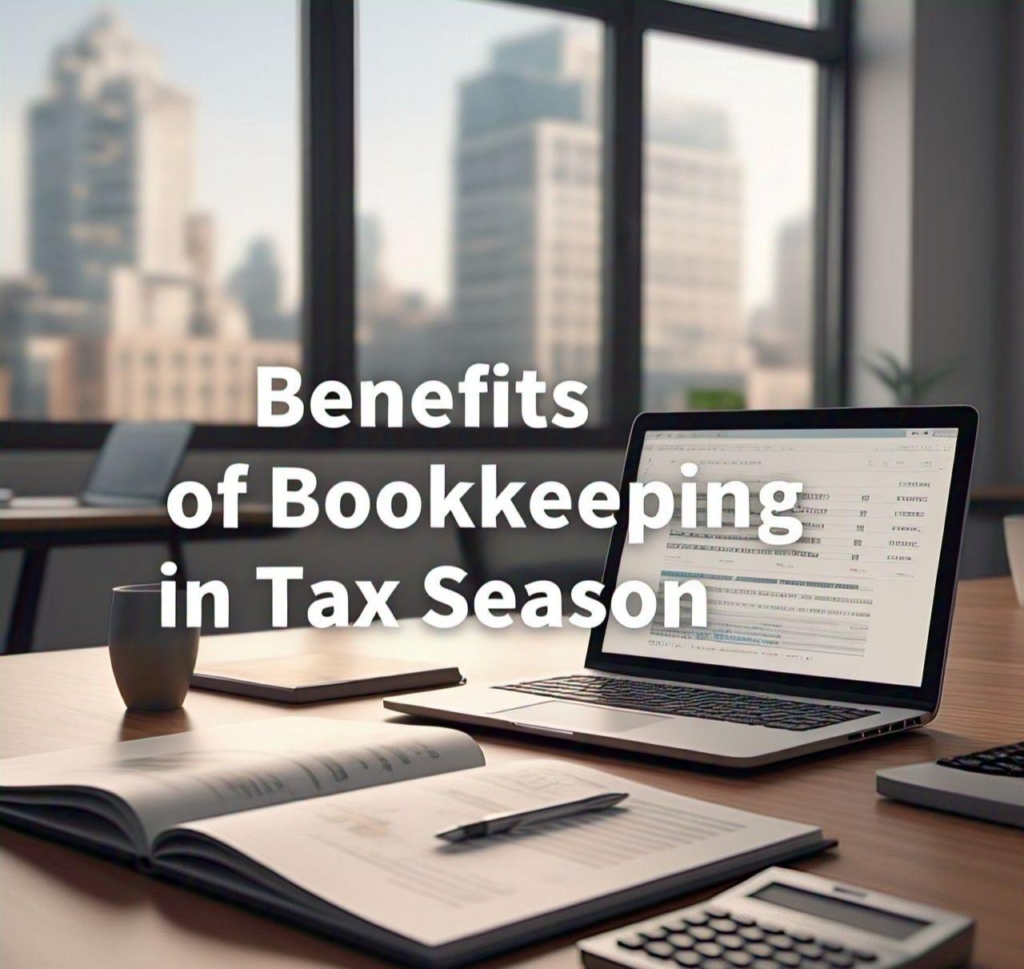
Bookkeeping plays a vital role in ensuring stress-free compliance during tax season. By maintaining accurate and up-to-date financial records, businesses can reap numerous benefits that make tax season less daunting. In this section, we’ll explore the benefits of bookkeeping in tax season.
1. Accurate Financial Reporting: Bookkeeping enables you to generate accurate financial reports, including balance sheets, income statements, and cash flow statements. These reports are essential for tax compliance and provide a clear picture of your business’s financial health.
2. Identify Tax Savings Opportunities: By maintaining accurate financial records, you can identify tax savings opportunities, such as deductions and credits, that can help reduce your tax liability.
3. Streamline Tax Preparation: Bookkeeping helps streamline tax preparation by providing all the necessary financial information in one place. This saves time and reduces the stress associated with tax preparation.
4. Avoid Penalties and Fines: By ensuring accurate and timely financial reporting, you can avoid penalties and fines associated with non-compliance.
5. Improved Cash Flow Management: Bookkeeping helps businesses manage their cash flow more effectively by:
– Tracking income and expenses
– Identifying areas for cost reduction
– Enabling businesses to make informed financial decisions
Improved cash flow management reduces the risk of cash flow problems during tax season.
6. Enhanced Financial Decision-Making: Accurate financial records provide businesses with the necessary data to make informed financial decisions, such as:
– Identifying areas for investment
– Determining the feasibility of new projects
– Evaluating the financial impact of business decisions
By making informed financial decisions, businesses can drive growth and profitability.
7. Reduced Stress and Anxiety: Bookkeeping helps reduce stress and anxiety during tax season by:
– Providing a clear picture of a business’s financial health
– Enabling businesses to identify and address any financial discrepancies
– Streamlining tax preparation and reducing the risk of penalties and fines
By reducing stress and anxiety, businesses can focus on growth and development during tax season.
8. Improved Relationships with Stakeholders: Accurate financial records provide stakeholders, such as investors and lenders, with confidence in a business’s financial management. This can lead to:
– Improved relationships with stakeholders
– Increased access to funding and investment
– Enhanced credibility and reputation
By maintaining accurate financial records, businesses can demonstrate their commitment to financial responsibility and integrity.
THE BENEFITS OF ACCURATE AND UP-TO-DATE FINANCIAL RECORDS

Maintaining accurate and up-to-date financial records is crucial for businesses to ensure stress-free compliance during tax season. Here are the benefits of accurate and up-to-date financial records:
1. Improved Financial Management
– Accurate financial records enable businesses to make informed decisions about their financial resources.
– Up-to-date financial records help businesses identify areas for cost reduction and optimization.
2. Reduced Risk of Errors and Penalties
– Accurate financial records reduce the risk of errors and penalties during tax season.
– Up-to-date financial records ensure that businesses are in compliance with tax regulations.
3. Increased Efficiency and Productivity
– Accurate financial records streamline financial processes and reduce the time and effort required to manage finances.
– Up-to-date financial records enable businesses to quickly identify and address any financial discrepancies.
4. Better Cash Flow Management
– Accurate financial records help businesses manage their cash flow more effectively.
– Up-to-date financial records enable businesses to identify areas for improvement and make informed decisions about their financial resources.
5. Enhanced Financial Decision-Making
– Accurate financial records provide businesses with the necessary data to make informed financial decisions.
– Up-to-date financial records enable businesses to quickly respond to changes in the market and make strategic decisions.
6. Improved Relationships with Stakeholders
– Accurate financial records provide stakeholders, such as investors and lenders, with confidence in a business’s financial management.
– Up-to-date financial records demonstrate a business’s commitment to transparency and accountability.
7. Reduced Stress and Anxiety
– Accurate financial records reduce the stress and anxiety associated with tax season.
– Up-to-date financial records provide businesses with peace of mind, knowing that their financial records are accurate and compliant.
8. Increased Opportunities for Growth
– Accurate financial records provide businesses with the necessary data to identify opportunities for growth.
– Up-to-date financial records enable businesses to make informed decisions about investments and expansion.
9. Improved Compliance with Tax Regulations
– Accurate financial records ensure that businesses are in compliance with tax regulations.
– Up-to-date financial records reduce the risk of errors and penalties during tax season.
10. Enhanced Reputation and Credibility
– Accurate financial records demonstrate a business’s commitment to transparency and accountability.
– Up-to-date financial records enhance a business’s reputation and credibility with stakeholders.
By maintaining accurate and up-to-date financial records, businesses can reap these benefits and ensure stress-free compliance during tax season.
BEST BOOKKEEPING PRACTICES FOR TAX COMPLIANCE
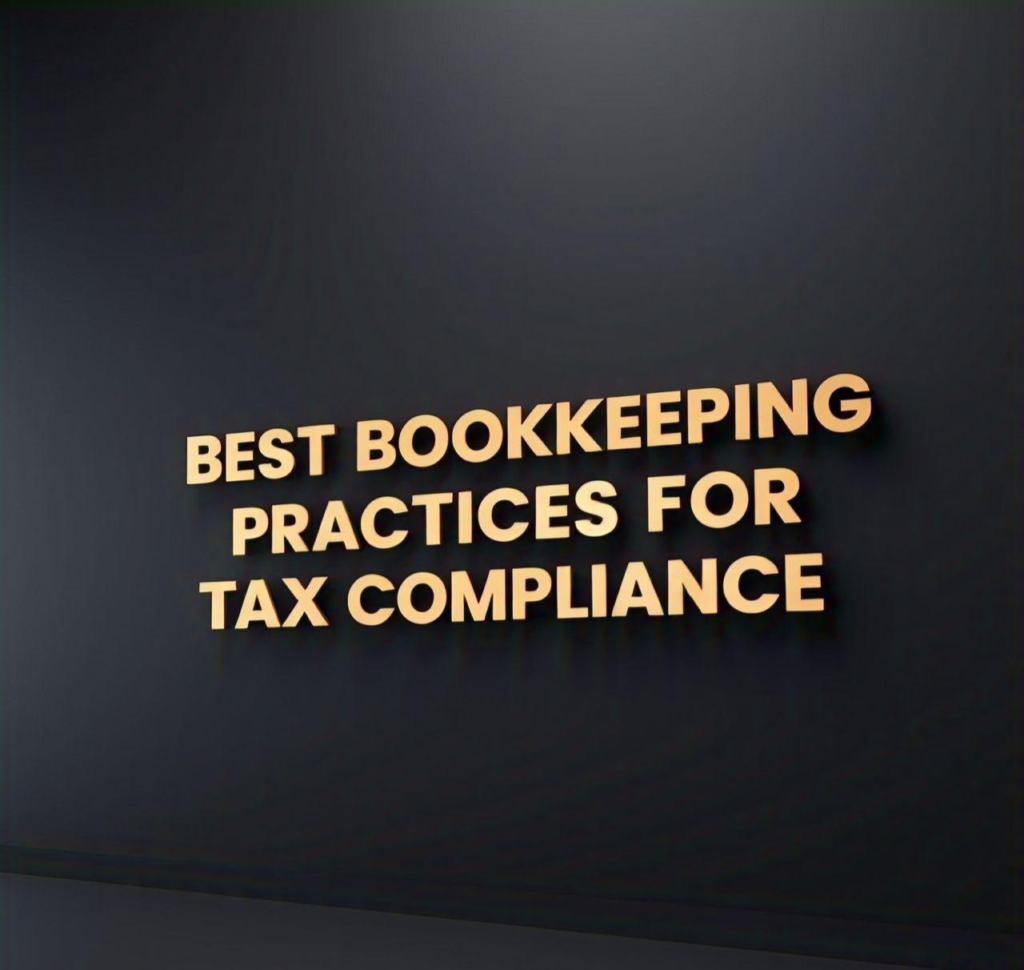
To ensure stress-free compliance during tax season, it’s essential to follow best bookkeeping practices. Here are some best practices to help you maintain accurate and compliant financial records:
1. Maintain Accurate and Up-to-Date Financial Records
– Record all financial transactions, including income, expenses, assets, liabilities, and equity.
– Ensure accuracy and completeness of financial data.
– Regularly review and update financial records.
2. Implement a Robust Accounting System
– Use a reliable accounting software, such as QuickBooks or Xero.
– Set up a chart of accounts that accurately categorizes financial transactions.
– Ensure proper accounting for assets, liabilities, and equity.
3. Reconcile Accounts Regularly
– Reconcile bank and credit card statements monthly.
– Investigate and resolve any discrepancies or errors.
– Adjust financial records to reflect reconciliations.
4. Maintain Supporting Documentation
– Keep receipts, invoices, and bank statements to support financial transactions.
– Organize documentation in a logical and accessible manner.
– Ensure documentation is retained for the required period.
5. Stay Up-to-Date with Tax Regulations
– Stay informed about changes to tax laws and regulations.
– Adjust bookkeeping practices to comply with new regulations.
– Consult with a tax professional or accountant as needed.
6. Use Accrual Accounting
– Match revenues and expenses in the same period.
– Account for accounts receivable and payable.
– Ensure accurate financial reporting.
7. Keep Personal and Business Finances Separate
– Maintain separate bank accounts and credit cards for personal and business use.
– Avoid commingling personal and business finances.
– Ensure accurate financial reporting.
8. Review Financial Statements Regularly
– Regularly review balance sheets, income statements, and cash flow statements.
– Identify and correct any errors or discrepancies.
– Use financial statements to make informed business decisions.
- Consult with a Tax Professional or Accountant
Consult with a tax professional or accountant to ensure compliance with tax regulations.
– Seek guidance on complex bookkeeping or tax issues.
– Ensure accurate and compliant financial reporting.
10. Stay Organized and Focused
– Stay organized and focused during tax season.
– Prioritize bookkeeping and tax preparation tasks.
– Ensure accurate and compliant financial reporting.
By following these best bookkeeping practices, you can ensure stress-free compliance during tax season and maintain accurate and compliant financial records.
COMMON BOOKKEEPING MISTAKES TO AVOID
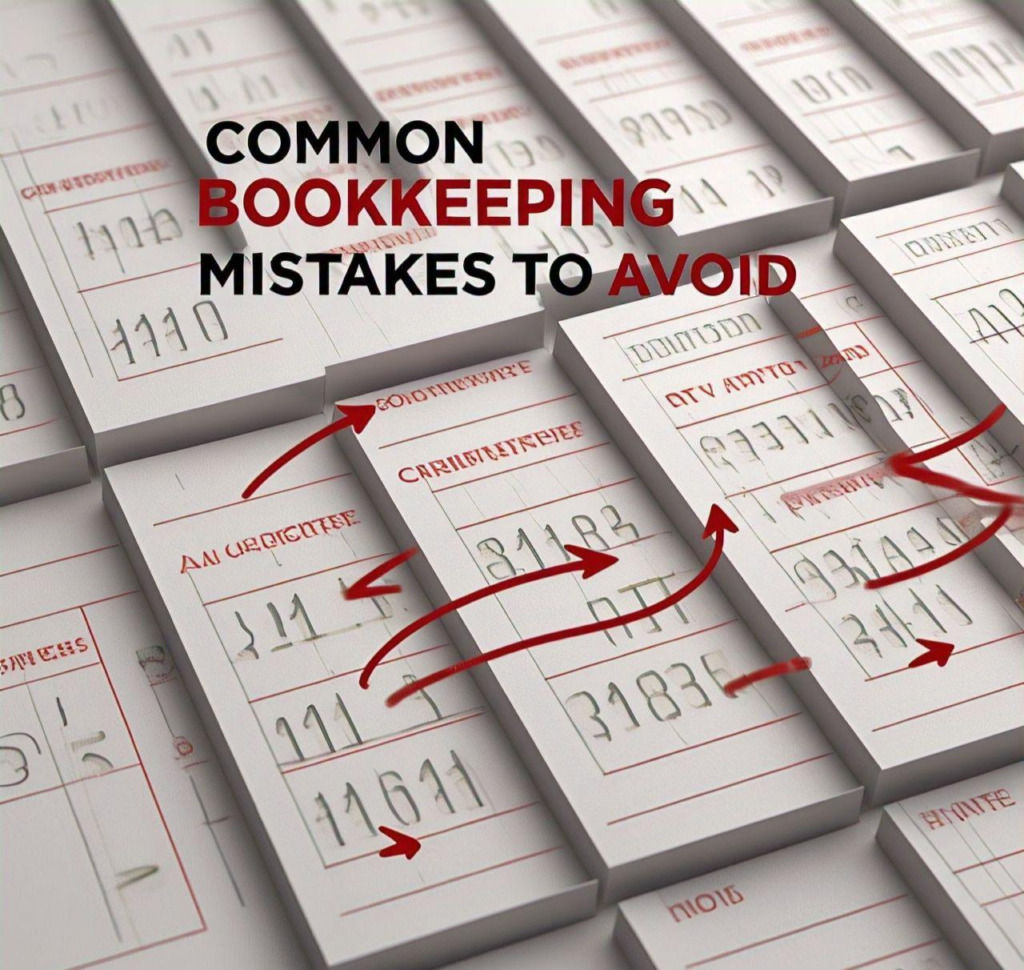
Bookkeeping is a critical component of tax compliance, and mistakes can lead to errors, penalties, and fines. Here are some common bookkeeping mistakes to avoid:
- Inaccurate or Incomplete Financial Records
- Failure to record transactions accurately or in a timely manner
- Incomplete or missing financial data
- Incorrect classification of income or expenses
- Failure to Reconcile Accounts
- Not reconciling bank and credit card statements regularly
- Failure to investigate and resolve discrepancies
- Not adjusting financial records to reflect reconciliations
- Inadequate Documentation
- Failure to maintain supporting documentation for financial transactions
- Inadequate records for tax deductions and credits
- Not retaining financial records for the required period
- Misclassification of Income or Expenses
- Incorrectly classifying income or expenses as personal or business-related
- Failure to separate business and personal finances
- Misclassifying employees as independent contractors
- Not Accounting for Sales Tax or GST/HST
- Failure to collect or remit sales tax or GST/HST
- Not accounting for sales tax or GST/HST on financial statements
- Inaccurate calculation of sales tax or GST/HST
- Not Using Accrual Accounting
- Using cash accounting instead of accrual accounting
- Not matching revenues and expenses in the same period
- Not accounting for accounts receivable and payable
- Not Keeping Track of Depreciation
- Not depreciating assets correctly
- Not keeping track of accumulated depreciation
- Not accounting for depreciation on financial statements
- Not Accounting for Payroll Taxes
- Not accounting for payroll taxes correctly
- Not keeping track of payroll tax deductions
- Not remitting payroll taxes on time
- Not Keeping Track of Business Use of Personal Assets
- Not keeping track of business use of personal assets
- Not accounting for business use of personal assets on financial statements
- Not calculating business use of personal assets correctly
- Not Reviewing Financial Statements Regularly
- Not reviewing financial statements regularly
- Not identifying and correcting errors or discrepancies
- Not using financial statements to make informed business decisions
By avoiding these common bookkeeping mistakes, businesses can ensure accurate and compliant financial record-keeping, reduce the risk of errors and penalties, and make tax season less stressful.
FREQUENTLY ASKED QUESTIONS
Here are some frequently asked questions about bookkeeping and tax compliance:
General Bookkeeping and Tax Compliance Questions
- What is the importance of bookkeeping in tax compliance?
Bookkeeping is essential for accurate and timely financial reporting, which is critical for tax compliance.
2. What are the consequences of poor bookkeeping practices?
Poor bookkeeping practices can lead to penalties, fines, and even audits.
3. How can I ensure stress-free compliance during tax season?
Maintain accurate and up-to-date financial records, seek professional help when needed, and stay informed about tax laws and regulations.
Tax Season and Deadlines Questions
- What is the deadline for filing taxes in Canada?
The deadline for filing taxes in Canada is April 30th for individuals and June 15th for self-employed individuals.
2. What are the penalties for late tax filing in Canada?
The penalties for late tax filing in Canada include a late-filing penalty of 5% of the balance owing, plus 1% of the balance owing for each full month that the return is late, up to a maximum of 12 months.
3, Can I file for an extension on my tax return?
Yes, you can file for an extension on your tax return, but you will still need to pay any taxes owing by the original deadline.
Bookkeeping and Financial Record-Keeping Questions
- What financial records do I need to keep for tax purposes?
You should keep records of all financial transactions, including income, expenses, assets, liabilities, and equity.
2. How long do I need to keep financial records for tax purposes?
You should keep financial records for at least six years from the end of the tax year.
3. Can I use accounting software to manage my financial records?
Yes, accounting software can help you manage your financial records and streamline your bookkeeping processes.
Hiring a Professional Bookkeeper or Accountant Questions
- Do I need to hire a professional bookkeeper or accountant?
It depends on the complexity of your financial situation and your level of expertise. If you’re unsure, consider consulting with a professional.
2. What qualifications should I look for in a professional bookkeeper or accountant?
Look for certifications such as CPA, CA, or CMA, and ensure they have experience working with businesses similar to yours.
3. How much does it cost to hire a professional bookkeeper or accountant?
The cost varies depending on the services needed, the complexity of your financial situation, and the professional’s level of expertise.
By understanding these frequently asked questions, you’ll be better equipped to manage your bookkeeping and tax compliance tasks, ensuring a stress-free tax season.
CONCLUSION
Tax season presents a mixture of benefits and challenges, each impacting individuals and businesses in different ways. The positives of tax season—such as refunds, financial organization, and professional advice—offer opportunities for better financial health and long-term planning. However, the negatives, including stress, complexity, and the risk of errors, can make tax season a difficult time for many.
To make the most of tax season, it is essential to approach it with preparation and foresight. Keeping accurate records, staying informed about tax laws, and seeking professional guidance can help reduce the stress and potential pitfalls. With the right planning and mindset, tax season can be a time for financial growth and peace of mind rather than a source of anxiety.
Tax season can be a daunting and stressful time for businesses, but it doesn’t have to be. By understanding the critical role of bookkeeping in ensuring stress-free compliance, businesses can navigate tax season with confidence and ease.
In this article, we’ve explored the importance of bookkeeping in tax compliance, the benefits of accurate and up-to-date financial records, and the common mistakes to avoid. We’ve also provided answers to frequently asked questions and offered guidance on how to ensure stress-free compliance during tax season.
By maintaining accurate and up-to-date financial records, businesses can:
– Ensure accurate and timely financial reporting
– Identify tax savings opportunities
– Streamline tax preparation
– Avoid penalties and fines
– Improve cash flow management
– Enhance financial decision-making
– Reduce stress and anxiety during tax season
In addition, businesses can benefit from:
– Improved relationships with stakeholders
– Increased credibility and reputation
– Better management of financial resources
– Increased efficiency and productivity
In conclusion, bookkeeping is a critical component of tax compliance, and its importance cannot be overstated. By prioritizing bookkeeping and maintaining accurate and up-to-date financial records, businesses can ensure stress-free compliance during tax season and achieve long-term financial success.
FINAL THOUGHTS
As tax season approaches, remember that accurate and up-to-date financial records are the key to stress-free compliance. Don’t wait until the last minute to address your bookkeeping needs. Take control of your financial records today and ensure a smooth and stress-free tax season.
CALL TO ACTION
If you’re unsure about your bookkeeping practices or need help with tax compliance, don’t hesitate to reach out to our team of experts. We’re here to provide personalized guidance and support to ensure that your business is in compliance with tax regulations.
Book a consultation with us at sjohn@glhaccounting.ca today and take the first step towards stress-free compliance during tax season!
ABOUT AUTHOR
Shanel John is a dedicated Certified Public Accountant (CPA) at G.L.H. Accounting, specializing in Income Tax with 10 years of experience. Based in Brampton, Ontario, Canada, Shanel offers expertise in tax preparation, financial accounting, and advisory services. A certified QBO Pro Advisor, Shanel’s decade-long experience and knowledge make her a trusted figure in the accounting field.
ADDITIONAL RESOURCES
For further information and guidance on bookkeeping and tax compliance, please visit the following resources:
Government Resources
1. Canada Revenue Agency (CRA): http://www.cra.gc.ca/
2. Government of Canada – Taxation: http://www.canada.ca/en/revenue-agency/services/tax/businesses.html
Accounting and Bookkeeping Resources
1. QuickBooks: http://www.quickbooks.ca/
2. Xero: http://www.xero.com/ca
3. CPA Canada: http://www.cpacanada.ca/
Business and Finance Resources
1. Canadian Federation of Independent Business (CFIB): http://www.cfib-fcei.ca/
2. Financial Post: https://glhaccounting.ca/blog/

